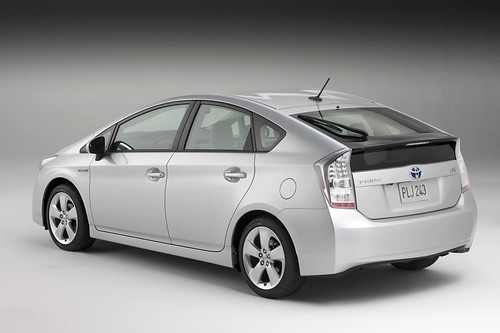New Study Report Makes a Strong Case for Plug-In Hybrid Electric Vehicles
The U.S. Department of Energy’s Alternative Fuels and Advanced Vehicles Data Center has released a report that evaluates value-added propositions for plug-in hybrid electric vehicles (PHEVs) that might help overcome the initial price premium related to comparable internal combustion engine and hybrid electric vehicles. The report also assesses other non-monetary benefits and barriers related to an emerging PHEV fleet, including environmental, societal, and electric grid impacts.
Here is a quick peek into the study’s background, objectives, results and conclusions as shown in the fact sheet:
- To identify and evaluate value-added propositions for PHEVs that will help overcome the initial price premium relative to comparable ICEs and HEVs and
- To assess other non-monetary benefits and barriers associated with an emerging PHEV fleet, including environmental, societal, and grid impacts.
Results:
Study results indicate that a single PHEV-30 on the road in 2030 will:
- Consume 65% and 75% less gasoline than a comparable HEV (Hybrid Electric Vehicle) and ICE (Internal Combustion Engine), respectively.
- Displace 7.25 and 4.25 barrels of imported oil each year if substituted for equivalent ICEs and HEVs, respectively, assuming 60% of the nation’s oil consumed is imported.
- Reduce net ownership cost over 10 years by 8-10% relative to a comparable ICE and be highly cost competitive with a comparable HEV.
- Use 18-22% less total W2W energy than a comparable ICE, but 8-13% more than a comparable HEV (assuming a 70/30 split of E10 and E85 use in 2030).
- Emit 10% less Well to Wheel (W2W) CO2 than equivalent ICEs in southern California and emits 13% more W2W CO2 than equivalent ICEs in the ECAR region. This also assumes a 70/30 split of E10 and E85 (ethanol blends) use in 2030.
Conclusions:
PHEVs and other plug-in vehicles on the road in 2030 may offer many valuable benefits to utilities, business owners, individual consumers, and society as a whole by:
- Promoting national energy security by displacing large volumes of imported oil.
- Supporting a secure economy through the expansion of domestic vehicle and component manufacturing.
- Offsetting the vehicle’s initial price premium with lifetime operating cost savings (e.g., lower fuel and maintenance costs).
- Supporting the use of off-peak renewable energy through smart charging practices. However, smart grid technology is not a prerequisite for realizing the benefits of PHEVs.
- Potentially using its bidirectional electricity flow capability to aid in emergency situations or to help better manage a building’s or entire grid’s load.
PHEVs and other plug-in vehicles still face barriers to commercial acceptance:
- In the near term, the cost of energy storage, charging equipment, and PE&EM components must continue to descend to competitive levels, such as the ones assumed in this study. Industry trends imply that these cost reductions are on track to reach competitive price levels.
- PHEVs’ inability to reduce carbon emissions relative to ICEs unless they are powered primarily by non-carbon energy sources. A grid-connected vehicle’s high dependence on its region’s generation mix is very evident in this study’s findings. Operating in regions with a high percentage of non- or low-carbon energy sources (e.g., renewable, nuclear, and natural gas) would ultimately help improve the long-term environmental impacts of PHEVs.
Note: The Acronym PHEV-30 stands for Plug-in Hybrid Electric Vehicle with an All Electric Range (AER) equivalent of 30 miles.
Click here to download/access the entire report (PDF – 218 pages long).
Related articles
- Study Finds Public Policies Needed to Boost EV Fleet Purchases (environmentalleader.com)
- Electric Vehicle Sales in Asia Pacific to Total 1.4 Million by 2015, Forecasts Pike Research (eon.businesswire.com)
- Electrification Coalition Releases Plan for 16M Electric Fleet Vehicles (solarfeeds.com)
- “Plug-in Prius is NOT a plug-in hybrid electric vehicle!” and related posts (hybridcarblog.com)
- Pike survey finds unproven technology and reliability concerns may hinder consumer demand for plug-in electric vehicle, although about 44% of respondents are interested in purchasing one (greencarcongress.com)
- Reportlinker Adds Hybrid Electric Vehicles for Fleet Markets (prnewswire.com)
- 3.2 Million Plug-in Electric Vehicles to be Sold Worldwide by 2015, Forecasts Pike Research (eon.businesswire.com)
- Electrification Coalition releases Fleet Electrification Roadmap; suggests fleet adoption could put a cumulative 200,000 PHEVs and EVs on the road by 2015 (greencarcongress.com)
- Pike forecasts Asia-Pacific to be largest PEV market, with more than 1.2M units by 2015; China to represent 53% of total sales (greencarcongress.com)
- Bloomberg New Energy Finance forecasts plug-in electric vehicles could account for up to 9% of US auto sales in 2020 and 22% in 2030 (greencarcongress.com)
- J.D. Power forecasts hybrid- and battery-electric vehicles will represent 7.3% of global auto sales in 2020 (greencarcongress.com)
- Hybrid Fleet Vehicle Sales to Surpass 740,000 Units per Year in 2015, According to Pike Research (eon.businesswire.com)
- Plug-In EV Market to Sell 3.2M Units by 2015 (environmentalleader.com)
- BeFrugal.com Proposes Cost Equivalent MPG Calculation for Electric Vehicles (prnewswire.com)






